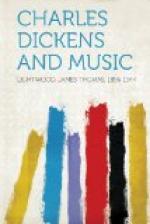I gave him sixpence (for he was kept as short as he was long), and he laid it out on two three penn’orths of gin-and-water, which so brisked him up that he sang the favourite comic of ‘Shivery Shakey, ain’t it cold?’
Perhaps in no direction does the taste of the British public change so rapidly and so completely as in their idea of humour as depicted in the comic song, and it is unlikely that what passed for humour sixty years ago would appeal to an audience of the present day. The song here referred to had a great though brief popularity. This is the first verse:
THE MAN THAT COULDN’T GET WARM.
Words by J. Beuler. Accompaniment by J. Clinton.
All you who’re fond
in spite of price
Of pastry, cream and jellies
nice
Be cautious how you take an
ice
Whenever you’re
overwarm.
A merchant who from India
came,
And Shiverand Shakey was his
name,
A pastrycook’s did once
entice
To take a cooling, luscious
ice,
The weather, hot enough to
kill,
Kept tempting him to eat,
until
It gave his corpus such a
chill
He never again
felt warm.
Shiverand Shakey O, O, O,
Criminy Crikey! Isn’t
it cold,
Woo, woo, woo, oo, oo,
Behold the man
that couldn’t get warm.
Some people affect to despise a comic song, but there are instances where a good specimen has helped to make history, or has added a popular phrase to our language. An instance of the latter is MacDermott’s ‘Jingo’ song ’We don’t want to fight but by Jingo if we do.’ An illustration of the former comes from the coal strike of March, 1912, during which period the price of that commodity only once passed the figure it reached in 1875, as we gather from the old song ‘Look at the price of coals.’
We don’t know what’s
to be done,
They’re forty-two shillings
a ton.
There are two interesting references in a song which Mrs. Jarley’s poet adapted to the purposes of the Waxwork Exhibition, ‘If I’d a donkey as wouldn’t go.’ The first verse of the song is as follows:
If I’d a donkey wot
wouldn’t go,
D’ye think I’d
wollop him? No, no, no;
But gentle means I’d
try, d’ye see,
Because I hate all cruelty.
If all had been like me in
fact,
There’d ha’ been
no occasion for Martin’s Act
Dumb animals to prevent getting
crackt
On
the head, for—
If I had a donkey wot wouldn’t
go,
I never would wollop him,
no, no, no;
I’d give him some hay,
and cry gee O,
And
come up Neddy.
The singer then meets ‘Bill Burns,’ who, ’while crying out his greens,’ is ill-treating his donkey. On being interfered with, Bill Burns says,
‘You’re one of these Mr. Martin chaps.’




